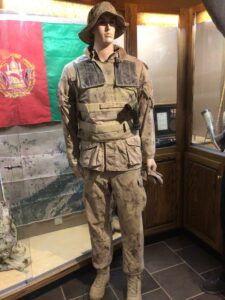Worn during rotation in Afghanistan.
a. Arrid Combat shirt with OMLT patches, b. arrid combat pants, c. Tan combat boots, d. Tan combat shirt, e. OTW (outside the wire) shirt with patches, f. Frag vest cover, g. tan gloves, h. tan cloth hat, i. olive drab flashlight, Bright Star MX – 212/U
Note name and blood type inked on frag vest cover.
Part of Full Fighting Order, 2006
The current operational dress was issued to the Canadian Army in 2002, replacing the older field dress and webbing. The new uniform introduced CADPAT (Short for Canadian Disruptive Pattern), an effective ‘digitalized’ camouflage pattern that allowed soldiers to better blend in to their surroundings and reduce detection by night vision goggles. An arrid print was developed for desert theatres of operation, and was deployed to Afghanistan between 2003 and 2004. A rank slip is worn in the centre of the chest, a name badge above the right breast pocket, and a Canadian flag on the left shoulder. A unit crest on the right arm indicates the soldier is a member of NATO’s International Security Assistance Force (ISAF).
The uniform also composes of personal protective equipment including the CG634 Kevlar helmet and ballistic eyewear, to protect the wearer from fragmentations and debris. A ballistic vest with composite plates serves as body armour, and a tac-vest is worn overtop for equipment and load bearing. The tac-vest features four C7 magazine pouches, four grenade pouches, a map pocket, 2 pouches for smaller equipment, and two larger pouches that are used for a canteen or C9 LMG ammunition box. A back panel also has attachments for using a hydration bladder or other pouches for additional equipment.

